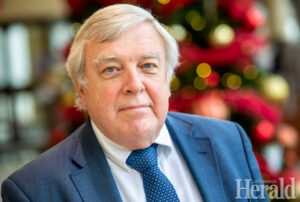Residents’ resiliency shines through; Mayor looks back on 2020, ahead to 2021
By Herald on January 4, 2021.
 Mayor Chris Spearman says residents have shown resilience despite weathering the worst year in the community's recent history. Herald photo by Ian Martens
@IMartensHerald
Mayor Chris Spearman says residents have shown resilience despite weathering the worst year in the community's recent history. Herald photo by Ian Martens
@IMartensHeraldTim Kalinowski
Lethbridge Herald
tkalinowski@lethbridgeherald.com
Mayor Chris Spearman says residents of the City of Lethbridge have shown resilience despite weathering the worst year in the community’s recent history in 2020, and he has faith that local strength of character will help the city get back on its feet again sooner rather than later.
“It (a pandemic) is something you never anticipate,” he says, “and it has been a challenge almost from the start in March. We have been struggling just like other communities across Alberta are struggling. In the summer COVID seemed to tail off a bit, but it has only been getting worse for the last two months.
“What we (at council) have tried to do is listen to the best information from the health authorities. We have tried to support that, and we were one of early ones proposing mandatory face coverings. We have tried to educate the community, and we will certainly support the province with the latest restrictions as well. We have tried to take a reasonable approach and say, ‘If we all work together, we all co-operate, we all protect each other, that will help protect our economy, and that will help keep businesses open. We have tried to maintain that balance.”
Spearman says city council has tried to pull whatever levers it can to get local residents through the worst economic impacts of the ongoing COVID-19 situation.
“As a council, we formed a special economic recovery committee,” he explains. “We tried to look at how the pandemic would impact our city, and we have come up with a number of programs and incentives to support business. We have changed our priorities when it came to seeking funding from the provincial government, and we have tried to target projects which would stimulate the economy as we go through the pandemic to create employment and provide opportunity for the private sector to take these investments and build on that going forward.
“We have tried also,” adds Spearman, “to assist by deferring tax payments to increase cashflow, utility payments deferrals as well. We are trying to help. We recently approved a budget proposal to provide an additional $500,000 to support people who are struggling to pay their rent, which would also help people who are landlords. We are trying to assist with those extra programs.”
Spearman says by re-opening the budget to try to keep property taxes at zero per cent increase for 2020, 2021 and 2022 that should help property owners in the community get some relief as they go through these difficult times.
“Those were challenging reductions for council,” he says, “and there were councillors who said we didn’t go far enough. But any councillor could have made additional proposals which would have been considered by council, and could have resulted in more savings. The challenge of course will be as the community sees the lower levels of services, and the lower funding for the police, there will be complaints saying we should have funded that. But that would have meant tax increases; so it is a balance. And we are trying to walk that fine line.”
The City will also be looking for other cost reductions, says Spearman, even post-budget by not replacing some retiring staff or filling some vacant positions.
“There are vacancies in City positions that won’t be filled,” he confirms, “but that also means lower service levels going forward. So while there were not layoffs announced, there are positions that have been vacant for some time that won’t be filled. We have already challenged our city manager to look at vacancies that occur through retirement, and to make sure we are not filling positions unnecessarily. So I believe there will be reductions in staffing, and levels of natural attrition.”
“It is easy to say let’s reduce staffing,” he adds, “but you will severely impact those services many citizens rely on if you do.”
Besides the fallout from COVID-19, the loss of local EMS dispatch has been another hot-button issue in the community, says Spearman, and a frustrating one to deal with because it is largely out of the City’s hands. There is still a faint hope Premier Jason Kenney will intervene in the situation, but Spearman acknowledges each passing day the premier remains silent on the issue means that hope is becoming ever fainter.
“We believe this will result in a significantly lower level of service,” he says. “(Alberta Health Services) has made no commitment to be transparent if they take over local ambulance dispatch. There is going to be no way to address the (expected) service level reductions. There have been complaints from communities for more than five years about the inefficiency of centralized EMS dispatch which largely centres around lack of geographic familiarity.
“The other thing that was not addressed by the provincial government, which is entirely within their responsibility,” he adds, “is the number of ambulances which get tied up on inter-facility transfers. I think it is shocking that a city like Lethbridge with six ambulances in service can have three of those ambulances tied up on inter-facility transfers leaving only three ambulances to provide for the needs of the city. It would have been far more effective to address the inter-facility transfers issue so that when our remaining ambulances are tied up, we are not having to bring in an ambulance from 20 km away to address an emergency.”
On a more positive note in municipal-provincial relations in 2020, Spearman appreciates the major funding announcements for Hwy. 3 twinning, airport renovations and the construction of the new Exhibition Park conference centre which will all begin work in 2021.
“It is great those announcements have been made,” he says, “and we are going forward on what I call catalytic projects which will stimulate additional economic investment. We do need to invest in the agri-food hub, and build on the tremendous assets we already have in Lethbridge and southwest Alberta. It is rare to have what we have with our industrial park, which is a food processing industry of an international calibre.
“So having those facilities, having an agricultural research centre, having a college and a university to support this industry is just fantastic.”
On glaring black eye the city continues to experience is a high crime rate, and the Statistics Canada Crime Severity Index placed Lethbridge first in that category again in 2019 in what is called the “Census Metropolitan Area,” which essentially means Lethbridge and surrounding rural areas and neighbouring communities. It is important to note, says Spearman, Lethbridge is not first in the Crime Severity Index among urban centres. In fact, he says, we are not even first in Alberta.
“I think people misunderstood that information and the way it came out,” he states. “That was the category ‘Census Metropolitan Area.’ And Lethbridge only became a Census Metropolitan Area in 2016. But when you look at the whole study, we are ranked the fifth worst city for crime in Alberta. There are cities that are ranked higher than us, but because they are Census Metropolitan Areas they weren’t included in that (category of the Crime Severity Index).”
Spearman says the ongoing crime problems in Lethbridge are inextricably linked to the poverty and the drug activity we have in our city, and that is where we have to look to for solutions.
“We know we have social problems in the City of Lethbridge related to addiction and a lack of housing supports,” he says. “On those issues we have been asking for supports since at least 2014, looking for intox facilities, detox facilities, supportive housing, and treatment, and we still don’t really have them. They have been announced, but we still don’t have the facilities in operation yet.”
Coming into 2021, Spearman hopes Lethbridge is finally able to turn the corner on COVID-19, but, he stresses, all residents need to continue to support one another in meantime.
“I hope people who can afford to do so will support our community organizations, our food banks, and others who are providing hope,” he says. “We are getting a lot of requests to the City for assistance. We have heard a lot of stories about people struggling to put food on the table, and having to provide small Christmas gifts for the families. They are challenged with meeting regular household expenses. Those are difficult stories. So as a community, we need to support each other, and at this time of year we ask those who have the capacity to help those that are struggling.”
Follow @TimKalHerald on Twitter
28-27




